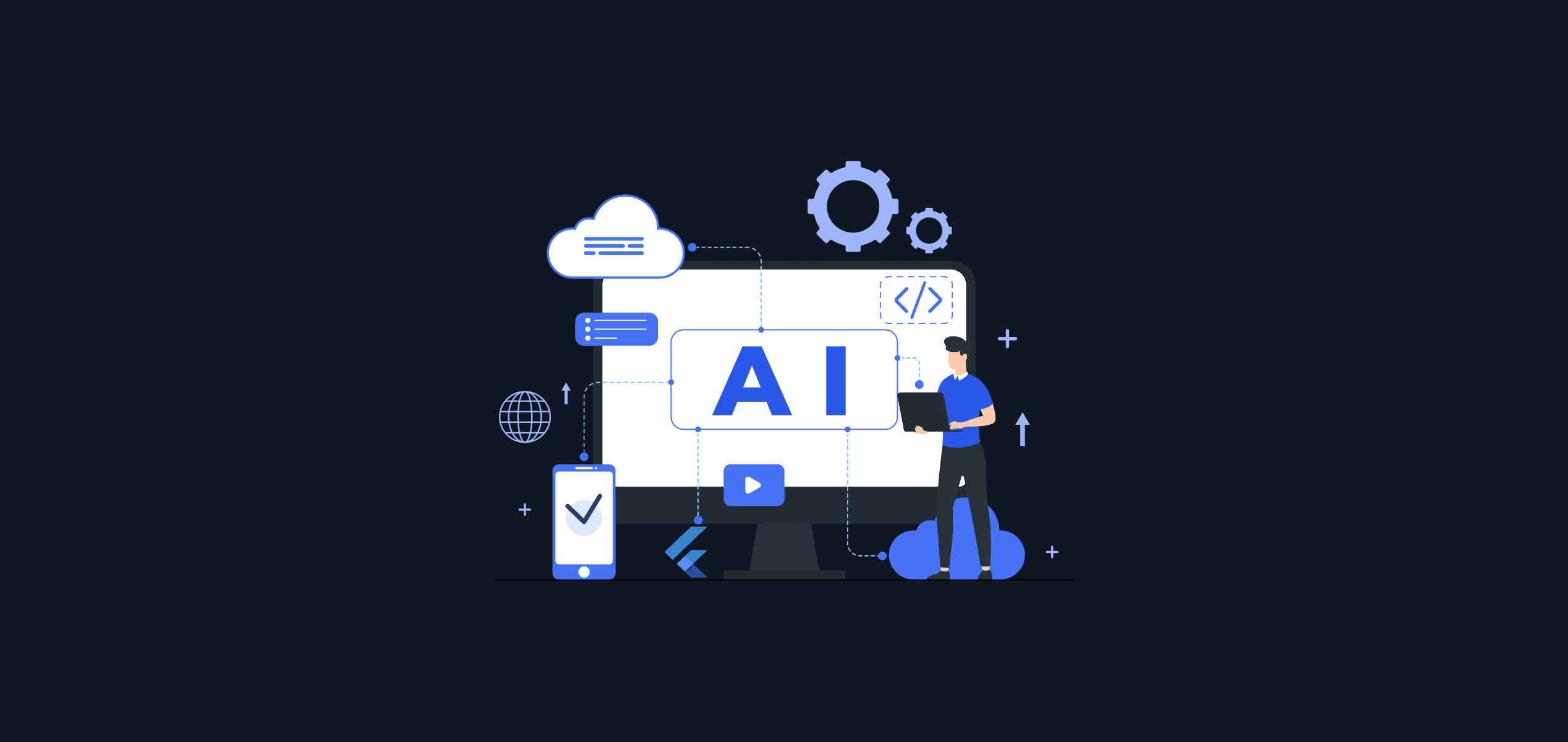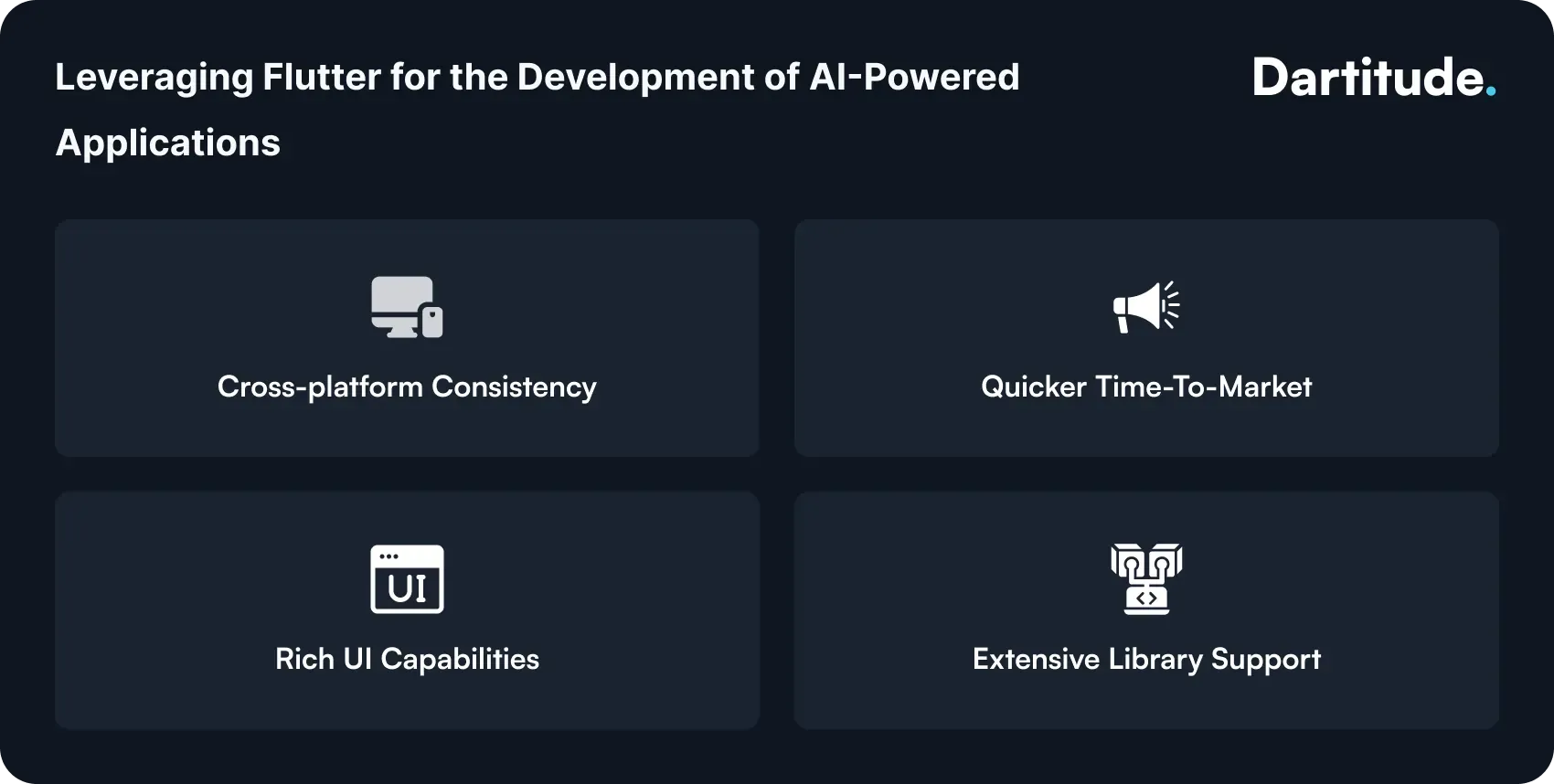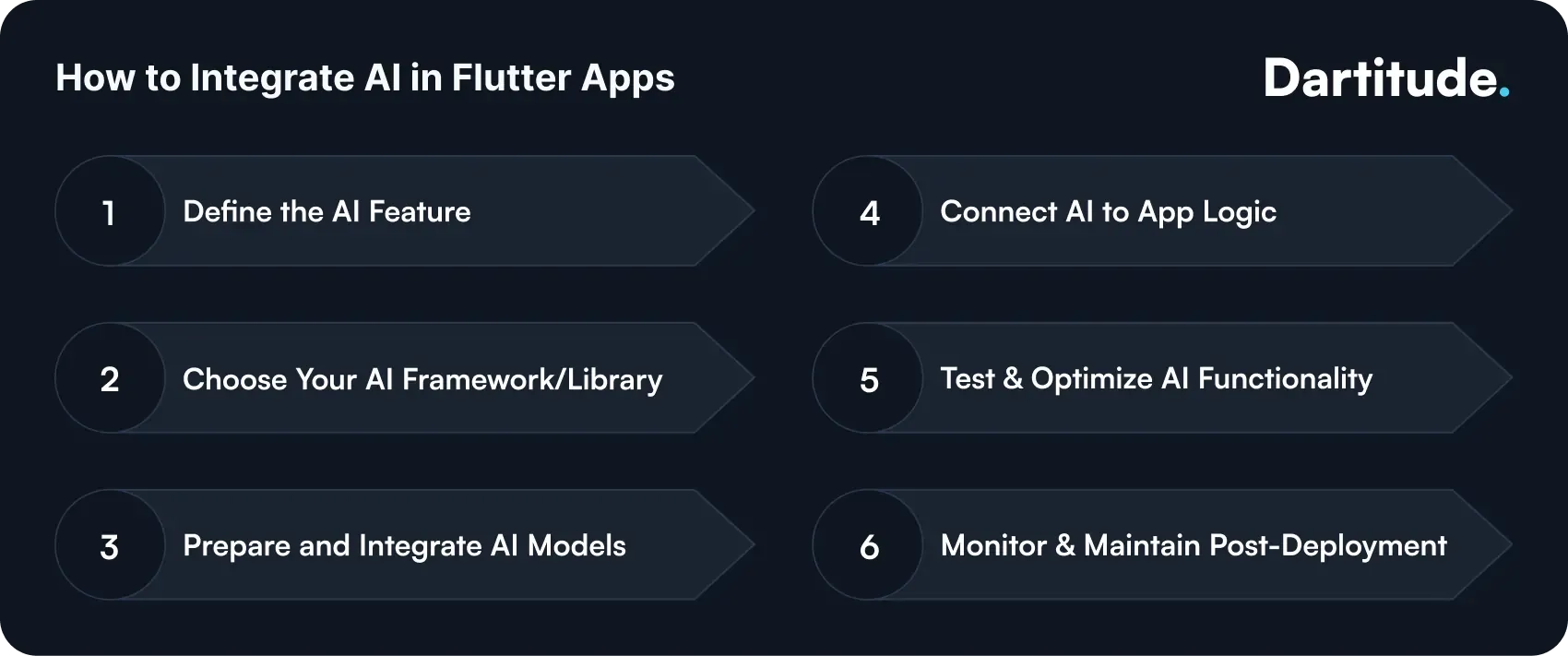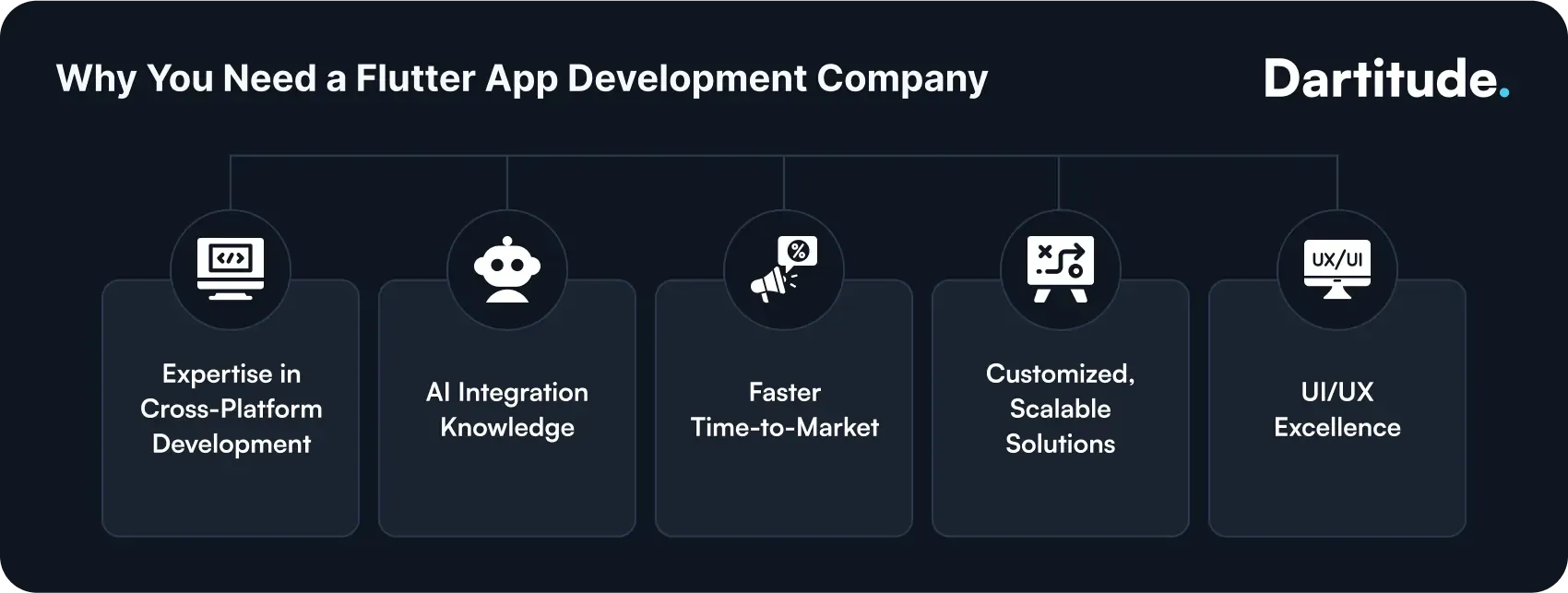
How Flutter AI Integration Creates Intelligent, Cross-Platform Apps
Just think about opening an app that already knows what you are thinking and want from it before you even tap a button. It recommends your next playlist based on your mood, analyzes your spending habits, and can do more.
That is the magic of Artificial Intelligence at work, transforming static apps into dynamic, deep learning digital platforms.
In today’s modern, tech-driven landscape, user needs have evolved, and they demand smart apps with personalized and responsive features. This is all possible only due to the global evolution of AI.
Yes, from chatbots and voice recognition to predictive analytics and voice recognition to image generation. Everything and everyone is rolling out in AI.
Flutter AI Integration brings the best of the concept that helps you to create AI-powered Flutter apps instantly with AI-enabled features. Google, Microsoft, Open-AI, all these big companies are creating a foundation for apps that learn, predict, and evolve with users' needs.
Leveraging Flutter for the Development of AI-Powered Applications

Flutter has frameworks and SDKs, well known for building seamless cross-platform applications with a convenient process. Recently, a client shared how their team faced challenges in handling endless calls and repetitive tasks every day, which was quite a hectic process.
By leveraging AI integration and expert Flutter app design services, those manual workflows were transformed into intelligent, predictive systems. The app can predict the behavior and turn your ordinary experiences into intelligent, personalized interactions.
1. Cross-platform consistency
Flutters can provide you with the opportunity to create applications by coding once at a time and then deploying across various platforms such as Android, iOS, and more.
Clients often call us, telling us every time, “We need the app to work on the same page everywhere continuously!”
Benefit?
- Predictive recommendations
- Use of natural language processing
- Give responses at a proper consistency level across all devices.
2. Quicker time-to-market
Now, there is no need to rewrite code for each single platform; AI-powered insights hit users faster than ever before. Testing becomes faster because of Flutter's ability to work with different platforms. AI-packed features can be implemented, tested, and updated efficiently without needing to rewrite code for each platform.
3. Rich UI capabilities
Flutter makes you to develop interactive, visually stunning interfaces and beautiful animations. Real-time updated dashboards, animations respond instantly, and personalized content keeps the users engaged for a longer period of time.
4. Extensive library support
Flutter has numerous tools ready to go- from TensorFlow Lite to PyTorch Mobile, even Google ML Kit, and different AI-enabled cloud services. These libraries let you adapt the AI features within a short period and are reliable, turning your vision into real-life experiences.
What Is Flutter AI Integration?

Flutter AI Integration isn’t some gimmick thing, but it’s all about making your apps actually intelligent, which can perform before you do. Whether it's a device or cloud, integrating both Flutter and AI simultaneously could enable your app not just to work, but also to think, feel, and predict your sentiments with a better response rate.
For businesses targeting to collaborate with Futter for enterprise app development, this integration allows you the major benefit of empowering applications to automate workflows, improve decision-making, and provide fully focused personalized user experiences.
So, what can this actually do? Is it possible to make your app the smartest on the block? Let's see:
1. Natural Language Processing (NLP)
In this era of artificial intelligence and machine learning, forget about creating boring interfaces - now, apps can understand and chat just like humans do. How? It's mainly due to the adaptation of NLP, which enables apps to communicate naturally with users, improving engagement and usability.
2. Computer Vision
Computer vision can enable your apps to recognize as well as images and videos. Use cases such as face recognition, image labeling, AR filters, and real-time video analysis could be done with the right additional features. This feature can be used in various industries such as e-commerce (visual search of a product), healthcare (diagnostic imaging), and more.
3. Predictive Analytics
In different types of industries, such as healthcare, e-commerce, predictive analytics is widely used. Why? It is mostly due to the capability of apps to make data-driven decisions by critical analysis of forecasting trends, analyzing patterns, and making recommendations. You can now avoid relying on complex manual calculations.
4. Voice Processing
Typing for long hours and then waiting for a response over the web, how lengthy was that process? But today, most of us know and use voice-enabled apps that can take our commands. It has become easier to get an instant response right on time. Features like voice search, command recognition, and speech-to-text make apps more user-friendly.
The future is now. You don't need heavy backend heavy calculation, no lagging, solution of complex tasks faster, all this is possible with the help of AI capabilities and integration of Flutter applications.
Popular AI Use Cases in Flutter Apps
AI integration is transforming industries. Here are some of the real-world use domains of AI integration:
1. Healthcare
- AI Use Case: AI is enabled in the industry with features like detecting anomalies in medical images, analyzing patient-related health patterns.
- Benefits: Using AI in this industry comes with lots of benefits, such as early diagnosis, better patient monitoring, and more detailed and accurate insights
2. E-commerce
- AI Use Case: VR and AR-enabled feature allows you to get the product recommendations easily.
- Benefits: Enabling AI helps in increasing conversion rates, a good user engagement ratio, and a better unified user experience.
3. Finance
- AI Use Case: ML models can be used to detect fraudulent activities, spending patterns for better decision-making.
- Benefits: Enhanced security, reduced fraud, and detailed financial insights for users
4. Fitness
- AI Use Case: Progress tracking, recommendations for the fitness of a particular individual based on diets
- Benefits: Improved workout accuracy, personalized fitness plans, and real-time feedback
5. Education
- AI Use Case: Personalized learning recommendations based on user behavior
- Benefits: Adaptive learning paths and higher engagement.
Each of these highlighted use cases above critically reflects how we can adopt AI personalization, efficiency, and intelligence to provide a user experience.
Also read: Top Apps Built With Flutter Framework
Best AI Libraries for Flutter Developers
In Flutter, AI libraries are critically necessary and need to be used as per requirements. Below are the best AI libraries for Flutter that one can consider:
| AI Library | Description | Key Features | Best Suited For | Rating |
| TensorFlow Lite | TFLite, a light version of the Google framework built mainly for running machine learning models on mobile-edge devices by optimizing them for low latency and small size | It comes up with features like offline capabilities, reduced model/binary size, and power efficiency. | Apps that need real-time AI without internet dependency (e.g., health tracking feature, image recognition). | 5/5 |
| Firebase ML Kit | This Google-based SDK framework enables developers to integrate various machine learning features into their apps without having the need for deep data expertise in neural networks. | This involves features like ready-to-use models for text, face, and image recognition- Cloud & on-device support, and a lot more. | Best for those who want quicker deployment and less knowledge of machine learning models. | 4/5 |
OpenAI API
| This is a cloud-based based that directly connects your Flutter app with powerful AI models like GPT for natural language understanding and content generation-based benefits. | Offers with features such as NLP & text generation- Chatbots, regular updates constantly improving AI models. | AI chatbots, recommendation engines, and content-generating apps | 5/5 |
| Google ML Kit for Flutter | Google ML Kit for Flutter is known as the integration of Google's ML Kit SDK into Flutter applications. | Focus on providing several features like Face & object detection- (text recognition) | It is most applicable for scanners and photo-processing applications | 4/5 |
| PyTorch Mobile | It aims to provide a runtime environment and tools for deploying PyTorch machine learning models on mobile end devices, across different platforms such as iOS, Android, and Linux. | Best suited for training deep neural networks | Developers building unique, domain-specific AI models | 4/5 |
KeyNote: Selecting the right AI library isn’t just about a technology thing; it’s about purpose. Choose wisely based on reliability, speed because the Flutter ecosystem is required for your app.
How to Integrate AI in Flutter Apps

Integrating AI into a Flutter app is a difficult process and needs proper care with planning. Below crucial steps will guide you through in detail:
1. Define the AI Feature
You must properly define the type of AI feature your app needs and the problem to be solved. Yes, users' needs are important to identify so that planning and success criteria can be designed accordingly.
2. Choose Your AI Framework/Library
One client came to us saying, “I lost my data, and many bugs were being identified at the time of scaling my Flutter app”. Make sure to check which AI models to choose, and it is to be locally based, like Pytorch mobile, or via online Cloud-based APIs such as ML Kit, OpenAI.
3. Prepare and Integrate AI Models
AI models are now an essential part of integration when the conversation is about AI AI-enabled Flutter app. You should check if the app has special requirements for pre-trained models. For this, you can think of choosing frameworks like Pytorch, Tensorflow, and more.
4. Connect AI to App Logic
Randomly connecting AI to your app will not lead you anywhere. Double-check that AI is connected with app logic and everything is running smoothly. You can connect AI outputs to UI to make predictions actionable by triggering the app features.
5. Test & Optimize AI Functionality
Testing is the core part when integrating AI into Flutter apps. Testing assists in making a comparison of AI predictions against test data sets to check their reliability. Further, Collecting user behaviour helps in refining the AI behaviour and improving personalisation.
6. Monitor & Maintain Post-Deployment
In order to keep the effectiveness of the app in loop, update the AI models with new features or information. Further, using app analytics lets you track conversions and check AI's effect on engagement.
The above steps help you in analysing how to integrate AI, but also give a clear roadmap with actionable steps that developers can follow thoroughly.
How Flutter AI integration helps build intelligent, cross-platform apps
Till now, we are all very well aware of how Flutter works and what its capabilities are, right? The main question arises: How does the process of flutter integration go in building up smart and cross-platform-based apps?
With the fast evolution of IoT and digitalization, users are not only in search of normal running apps with common features, instead they also demand apps that not only function but with advanced capabilities of thinking, learn, and adapting to users' needs.
This is completely possible with the help of Flutter AI integration, turning normal running apps into super intelligent companions that determine needs, personalize experiences, and provide real-time updates.
From e-commerce to finance and fintech, fitness-based domains, and AI-powered Flutter apps are reforming the base of industries and refining user expectations.
By integration of cross-platform efficiency with smart AI capabilities, developers can create apps that are not only functional but also truly enjoyable and transformative.
Mobile app development companies should change their workflow and adapt AI to every niche. Focus on creating intelligent, adaptive, and built with Flutter AI apps.
For enterprises targeting to know why to use Flutter matters, it delivers a single codebase for various platforms, fast development cycles, with low costs.
Challenges in Integrating AI with Flutter Apps
While Flutter AI integration enables developers to build intelligent, cross-platform apps, a lot of hurdles can affect the process. below are some of the challenges to be noted down:
1. Performance Limitations
To integrate Flutter apps with AI, there will be a requirement for massive-scale resources, which will ultimately slow the battery power, and lagging issues can also occur.
Solution: Go for the option of choosing lightweight frameworks such as TensorFlow or offloading processing.
2. Integration Complexity
Integrating your app with AI is a complex process and often needs expertise in AI frameworks as well as different platforms, so that the decision is made accordingly.
Solution: This can be solved by properly maintaining the well-documented libraries and modularizing AI code.
3. Platform-Specific Issues
A very common issue that can occur which performance can differ on several platforms because AI can perform differently on iOS and Android.
Solution: Do the cross-platform testing thoroughly and identify the bugs, and fix them instantly.
4. Data Privacy & Security
The user's data is important in healthcare or finance apps because AI functions on the user's data. This ultimately increases the risk of losing data privacy.
Solution: Implement encryption, secure storage, and ensure compliance with privacy regulations (e.g., GDPR, HIPAA)
Why You Need a Flutter App Development Company

With lots of options available for creating apps, it may look like an easy-going process, but in real-world scenarios, it requires a deep level of knowledge of UI/UX, back-end to front-end tech stack platform skills, and understanding of how to integrate apps with AI.
The benefits you can enjoy by collaborating with Flutter App Development Company are shown below:
1. Expertise in Cross-Platform Development
A professional Flutter development company makes sure that the program works seamlessly across desktop, web, and iOS platforms, minimizing the development cost and time.
2. AI Integration Knowledge
You think AI integration is a one-go process? But a deep level of understanding of key AI libraries, frameworks, and cloud APIs is needed. Natural processing and analytics decisions can be integrated by experience-based companies.
3. Faster Time-to-Market
Yes, an experienced development enterprise adopts trending approaches that can be used for integrating Flutter apps with AI.
4. Customized, Scalable Solutions
Many professional Flutter app development companies focus on expanding the base of your app, customized features with AI-enabled, and future-proof for AI updates, which is important for the continuous improvement of the operations.
5. UI/UX Excellence
An enterprise with relevant experience in creating strong, clear, and dynamic UI that enhances user experience should be selected for the app development process.
In essence, choosing the right Flutter app development company gives you the technical edge and AI readiness your business needs, making it crucial to hire Flutter developers who can turn your ideas into intelligent digital experiences.
Build Smarter Apps with Dartitude Labs
In 2025, building AI Flutter apps is a must. Users nowadays expect everything to be integrated with AI, making their experience more enjoyable and providing them with rich key features. Flutter AI integrations combine robust capabilities and efficiency to allow developers to create apps that are fast, smart, and more responsive in nature.
Collaborating and getting into partnership with experienced developers like Dartitude will allow you to create apps that will be reliable, scalable, and well-optimised for innovation.
We aim to build the AI-enabled Flutter apps and change your status in the field of the IoT industry by providing you with a smart solution that stands out in the market, from smooth AI integration to post-launch support. With Dartitude, your Flutter AI app becomes more than just software; it becomes a smart digital companion for your users, driving engagement, efficiency, and business growth.
FAQs
1. How do you integrate AI in a Flutter application?
The process of integrating AI into Flutter apps seems to be a difficult one. To do this, you need to focus on the embedding with the pertinent models such such as Frebase ML Kit, OpenAI AI, with the aim to add features like text generation, image recognition, and voice processing.
2. Is Kotlin Multiplatform (KMP) replacing Flutter?
Not really. Kotlin Multiplatform (KMP) is a well-known platform for sharing business logic across platforms, but it doesn’t replace Flutter’s UI-focused approach. Why? It's because Flutter provides a complete set of UI toolkit for developing native interfaces, while KMP focuses on code sharing and relies on native UI frameworks. Both can coexist depending on project needs.
3. How do you ensure cross-platform compatibility of an AI chatbot?
Several steps can be focused toon check if chatbots work properly across iOS, Android, such as using Flutter for a unified code base, Implementation of platform-agnostic APIs like Diagflow or Rasa.
4. What is the AI toolkit for Flutter?
Various forms of AI toolkits for Flutter are present that ease the process of integrating with ML and AI, such as Google ML Kit for Flutter, OpenAI API, and many more.
5. Is Flutter a hybrid or cross-platform framework?
No, Flutter is not a hybrid; instead, it follows cross platform framework. The main difference is that hybrid applications adapt with web views within native containers, whereas Flutter complies with native ARM code for every single platform. Better performance and consistent across the complete UI is possible with cross platform framework.


